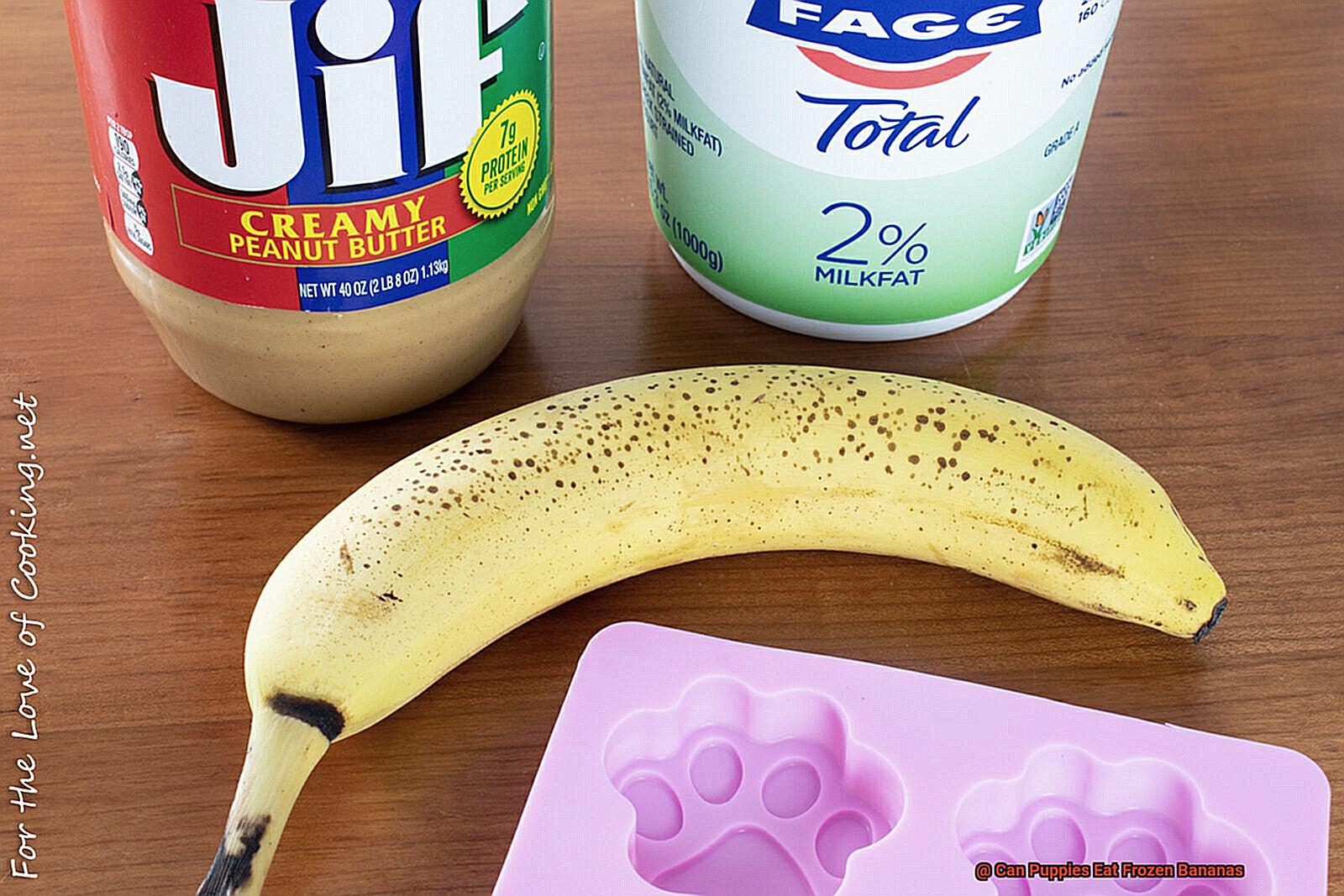Can Puppies Eat Frozen Bananas?
Can puppies eat frozen bananas? It’s a question many pet owners ask. After all, puppies love to snack on anything they can get their paws on! But is it safe for your pup to enjoy this delicious treat?
The good news is that frozen bananas can be a great snack for puppies. But there are some things you should know before giving them this delectable snack. In this blog post, we’ll answer the question: “Do puppies eat frozen bananas?” We’ll discuss the benefits and dangers of feeding your pup this type of treat.
So let’s find out if it’s safe for your furry friend to indulge in a frozen banana!
Can Puppies Eat Bananas?
Contents
- 1 Can Puppies Eat Bananas?
- 2 Can Dogs Eat Banana Peels?
- 3 Can Dogs Eat Frozen Strawberries?
- 4 How Much Banana Can I Give My Dog for Diarrhea?
- 5 Are Bananas Good for Dogs with Diarrhea?
- 6 Health Benefits of Feeding Your Dog Bananas
- 7 Potential Risks of Feeding Your Dog Bananas
- 8 Tips and Tricks on Feeding Your Dog Bananas
- 9 Conclusion
Bananas are a delicious and nutritious snack for puppies, providing them with essential minerals such as potassium, fiber, and vitamins. But can puppies eat bananas safely? The answer is yes – in moderation.

Bananas should always be ripe and peeled before giving them to your pup as unripe bananas can cause stomach upset. It’s also important to monitor how much banana your puppy eats as too much can lead to an upset stomach or diarrhea.
Frozen bananas are another great choice for your pup. The cold temperature of the frozen banana can help soothe an upset stomach or provide relief from teething pain. On a hot summer day, it’s like a refreshing treat for your pup.
Bananas are a tasty snack for puppies, but remember to always give them in moderation and keep an eye on how much your dog is eating. ==
Can Dogs Eat Banana Peels?
The answer is no. While they are not toxic, they can cause severe digestive problems if eaten in large amounts. Banana peels are difficult to digest and may lead to an obstruction in the digestive tract.
Bananas are a great source of fiber, vitamins, and minerals, but the peel contains even more of these nutrients than the flesh. If your dog does happen to get their paws on a banana peel, it’s important to watch for signs of gastrointestinal distress such as vomiting or diarrhea.
If your pup shows any of these signs, contact your veterinarian immediately.
Think of banana peels like an icy patch on a sidewalk – sure you might be safe and know what you’re doing, but if you don’t take the right precautions, you could slip and fall into danger.

Can Dogs Eat Frozen Strawberries?
Frozen strawberries may just be the perfect treat. Not only do they contain essential antioxidants and vitamins, but they are also refreshingly sweet and delicious.
However, it is important to remember that moderation is key when feeding your pup frozen strawberries. Too much can cause an upset stomach, so it is recommended to give them no more than two or three pieces per day. Make sure the pieces are not too hard, as this could lead to choking.

It’s best to serve your pup frozen strawberries without any added sugar or flavoring. This will help ensure that their food is safe and nutritious. In addition, if you’re uncertain whether or not your pup is allergic to strawberries, it’s best to consult with your veterinarian beforehand.
In conclusion, frozen strawberries make for a great summertime snack for pups of all sizes! Not only are they delectable and refreshing, but they can also help boost a dog’s immune system.
How Much Banana Can I Give My Dog for Diarrhea?
When your pup has an upset stomach, bananas can be a great way to help them feel better. That’s because bananas are packed with potassium, which helps to restore electrolyte balance and give your furry friend the energy they need. But how much banana should you give your pup?
The amount of banana you should give your dog will depend on their size and weight. Generally, it’s best to start with a small amount and increase as needed. A good rule of thumb is to feed about 1/4 banana for every 10 pounds of body weight per day. So if your dog weighs 20 pounds, you could give them 1/2 banana per day.

It’s important to note that bananas should not be used as the sole treatment for diarrhea in dogs and should only be given alongside other treatments recommended by your vet.
Are Bananas Good for Dogs with Diarrhea?
The answer is a resounding yes! Bananas are packed with pectin, a soluble fiber that helps to firm up stools in dogs with diarrhea. They also boast an abundance of potassium, which replenishes electrolytes lost due to diarrhea. Plus, their low fat content and easy digestion make them gentle on a pup’s tummy.
It’s important to note that bananas should not be used as a replacement for veterinary care and should only be fed in moderation as part of a balanced diet. Dogs with severe or chronic diarrhea should always be examined by a veterinarian for proper diagnosis and treatment.
But when your pup is feeling under the weather, consider bananas as the ultimate sweet treat for their stomach aches.
Health Benefits of Feeding Your Dog Bananas
Bananas are a tasty treat that can also provide your pup with numerous health benefits. Packed with dietary fiber, vitamins, and minerals such as potassium, magnesium, vitamin B6, and vitamin C, bananas can help your dog’s digestion and reduce inflammation in their gut. They can even help with diarrhea and constipation.
The high levels of potassium found in bananas can also keep your pup’s heart healthy, while providing them with a boost of energy for their active days.
Treating your pup to some bananas is like giving them a superfood smoothie! Not only will it satisfy their sweet tooth but it will also give them the nutrition they need for optimal health.
Potential Risks of Feeding Your Dog Bananas
Bananas are generally safe for dogs, but there are some things to consider before giving them this tasty treat.
First, moderation is key when it comes to feeding your dog bananas. Overfeeding can lead to digestive issues like diarrhea and vomiting. Bananas also contain high levels of sugar, so if you don’t want your pup to gain weight, you should monitor how much they’re eating. On top of that, bananas contain a lot of potassium which can be toxic in large amounts.
The banana peel is not suitable for consumption by dogs as it contains too much fiber, which can cause digestive issues. Never give your pup frozen bananas either – this could lead to choking or other health risks.
Tips and Tricks on Feeding Your Dog Bananas
Feeding your pup bananas is a great way to give them extra flavor and nutrients in their diet. Bananas are a nutritious fruit that contains a variety of essential vitamins, minerals, fiber, and antioxidants that can help promote a healthy diet for your pet.
If you’re giving your pup bananas, it’s important to peel them first as the peel can cause digestive issues. As large chunks can be difficult to swallow or chew properly, you should also cut the banana into small pieces before feeding it to your dog. If you decide to feed them frozen bananas, make sure they are completely thawed before handing them over.
During summer months, frozen bananas can be helpful for dogs with an upset stomach or those who have become overheated; however, it’s important not to give them too much at once and never more than one banana per day. It’s also essential to keep an eye on your pup while they eat bananas in order to ensure that they do not choke on any pieces or swallow large chunks without first chewing them properly.
Before giving your dog any new food item, including bananas, it’s always best to consult with a veterinarian first – especially if they have any health conditions or sensitivities that may be impacted by eating certain foods like bananas.
Conclusion
Bananas can be a delicious and nutritious snack for your pup. Packed with essential vitamins, minerals, and fiber, they can help keep your furry friend healthy.
However, it’s important to always feed in moderation and ensure the pieces are small enough so they don’t choke or swallow large chunks without chewing properly.
If you have any concerns about adding a new food item to your pup’s diet, always consult with a veterinarian first – especially if they have any health problems or sensitivities.




